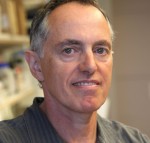
Dr. Poul Sorensen
Could cancer cells be starved into submission?
Cancer cells, because they grow and divide much more rapidly than normal cells, have tremendous appetites. And that might be a key to their undoing.
Poul Sorensen, a Professor in the Department of Pathology and Laboratory Medicine, used cell cultures, worm and mouse models, and studies of human brain tumours to show that the activation of a protein called eeF2K allows cancer cells to survive severe nutrient starvation.
His investigation, in collaboration with researchers at the University of Toronto, McGill University and in the U.K., U.S. and Germany, was based on a simple question: how do tumour cells and healthy cells respond to the challenge of caloric scarcity?
“We were surprised that only certain rare tumour cells could survive such deprivation,” says Dr. Sorensen, a Senior Scientist at the BC Cancer Agency. “We then set out to find the reason. It’s because they had somehow learned to activate eeF2K.”
When he and postdoctoral fellow Gabriel Leprivier put mice expressing low levels of eeF2K on a low-calorie diet, large portions of their tumours began to rapidly wither. In contrast, the tumours in mice with high levels of eeF2K were “virtually bullet-proof” in the face of caloric starvation, Dr. Sorensen says. The study – published in the journal Cell – suggests that aggressive cancer cells might be especially dependent on this enzyme to sustain their relentless proliferation. On the other hand, normal cells, with their moderate caloric needs, can survive without it.
That points to the possibility of targeting eeF2K. Most cancer treatments, including radiation and chemotherapy, are indiscriminate, killing both cancerous and healthy cells. But a drug that inhibits production of eeF2K might kill aggressive cancer cells and leave normal cells unharmed.
Dr. Sorensen and his colleagues, using technology at UBC and BCCA, are now searching libraries of compounds in search of a drug – either existing, or perhaps yet-to-be-developed – that does just that.